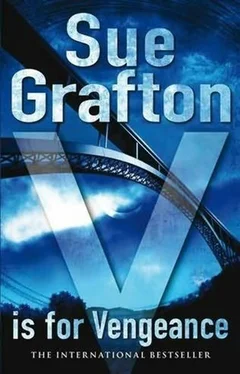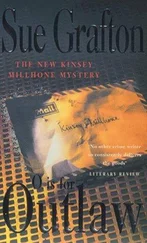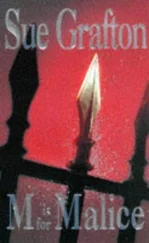“May I see your license and registration?”
“I’ll have to reach into the glove compartment. Is that all right? My wallet’s in my shoulder bag.”
He gestured his assent. This was the second time in twenty-four hours I’d been asked to provide identification. I slid into the driver’s seat and reached across to the glove compartment. Henry was meticulous about things of this sort, so I knew I could lay hands on the current paperwork, including proof of insurance. I found both and offered them to the officer. “The car belongs to my landlord,” I said. “He’s out of town and said I could drive the car in his absence to keep the battery from going dead.” I didn’t like talking to him from a seated position, but I wasn’t keen to exit the car again unless instructed to do so. Here are some handy little tips for those of you who don’t want to fall victim to deadly officer shootings: Do as you’re told. Don’t talk back. Don’t be rude or belligerent. Don’t try to escape. Don’t get back in your car and try to run over the nice officer performing the traffic stop. If you should be so foolhardy as to attempt any of the above, don’t complain later of your injuries and do not file suit.
I wanted to make sure he was watching me extract my wallet from my bag so he wouldn’t think I was about to pull out a little two-shot Derringer. I removed my driver’s license and a photocopy of my private investigator’s license from my wallet and handed them to the officer. He read the information on both and gave me a look, which I took as a form of encouragement-all of us law-enforcement types being in this together. His name tag said P. MARTINEZ, though he didn’t appear to be Hispanic. I wondered if wondering if he was Hispanic was a form of racism, but I thought not.
He walked over to the patrol car and conferred with the other officer. I took advantage of his absence to get out of the car again. The two walked back in my direction. Of course, there were no introductions. P. Martinez was tall and a bit on the hefty side, midforties, fully decked out in all the regulation paraphernalia: badge, belt, holstered gun, night stick, flashlight, keys, radio. He was a one-man army, prepared for just about anything. His partner, D. Charpentier, appeared to be in his fifties and similarly arrayed with an arsenal of crime-stopping gear. On a guy, there’s something sexy about all that shit. On a female officer, it only creates the illusion of being overweight. It’s amazing to me that any woman would volunteer for such a look.
Officer Martinez said, “You want to tell him what you just told me?”
“The long version or the short?”
“Take your time,” he said.
“I’m running a surveillance on the woman across the street. Her name is Georgia Prestwick. Last Friday, I was a witness to a shoplifting incident at Nordstrom’s that involved a woman named Audrey Vance, who’s since gone off the Cold Spring Bridge. All of this must have come up at one of your briefings.” I looked for a spark of recognition at the mention of Audrey’s name, but both were too professional to display facial feedback. At least I had their full attention. “Audrey was taken into custody, though I’m sorry to say I don’t know the name of the arresting officer. Georgia Prestwick was working with Audrey Vance, and she took advantage of the diversion to exit the store. I went after her and when she realized I was following her, she tried to run me down.”
All of this sounded preposterous in summary, but I’d launched into the account and I thought I’d best continue.
Officer Charpentier still held my driver’s license and copy of my PI license, and he seemed to make a study of both while I went on in this vein, dropping Maria Gutierrez’s name into the mix in case either gentleman was acquainted with her.
Winding up, I said, “At any rate, I think Ms. Prestwick is tied to a larger organization. I hope you’re not going to tell me she’s the one who called 9-1-1.”
The two officers exchanged a covert look, and I knew right then they’d read the article in the paper in which Diana Alvarez had bandied my name about. I may not have been drinking, but they had it on good authority that their fellow officer Len Priddy thought I was a crackpot.
Officer Martinez returned my two licenses. “No one called. We’ve been coming by twice a day, doing house checks for the property owner while he’s out of town. My partner’s the one who spotted you. Technically, we could cite you on the trespass, but we’re going to let that one go as long as you move on.”
“Thank you. I appreciate it.”
I glanced at the facade of the Tudor across the street. There were no lights visible, but that didn’t mean someone wasn’t looking out an upstairs window, attracted by the flash of police lights that were lighting up the night like a mortar attack. It was going to look better anyway if I left as I’d been asked to do. If the Prestwicks were peeking out, let them think I was drunk or a vagrant living in my car. That’s what our police presence is supposed to do, make our neighborhoods safe from the likes of me.
I got into my car. I removed the cardboard screen from the windshield and tossed it in the backseat. The two officers returned to their unit and got in, their two car doors slamming in quick succession. They waited until I pulled out and then followed me for a good eight blocks, assuring themselves that I wouldn’t circle back and park where I had before. When they turned off, I waved and drove home. I couldn’t believe cops were so distrustful.
NORA
Channing arrived in Montebello Saturday afternoon. He’d called from Malibu ostensibly to let her know he was on his way. She suspected his true intention was to test the waters on the home front, angling to see if his cover had been blown. She’d made a point of being pleasant on the phone, playing the conversation at exactly the right pitch, her manner easy and light. Certainly, there was none of the tension and fury he must have anticipated. As the exchange went on, she could hear him relax, relief seeping into his tone. She glossed over the particulars of how she’d spent her Wednesday afternoon, laying in just enough detail to make it convincing. She knew how anxious he’d be to avoid discovery. His feelings for Thelma were running high and he’d be determined to hold on to her. Eventually, he’d tire of her, but for now his affair provided all the thrills and suspense of a spy novel.
Nora heard his tires crunching in the gravel courtyard. She went downstairs, breathing deeply, like an actress getting into her role. Wednesday night was accounted for. The symphony had run ninety minutes. Afterward, she and Belinda and Nan had a bite to eat at a bistro across the street. Nora had picked up the check so Channing could see it for himself when the Visa bill came in. Lest he harbor any doubt, she’d tossed her concert program on the kitchen counter as though by oversight. Now all she had to do was explain the missing clothes.
Channing came into the kitchen from the garage, where he’d parked his car. He’d stopped at the mailbox and picked up the day’s delivery, so he was already separating the magazines from the catalogs. He put both stacks on the kitchen counter and glanced at the program in passing. “Mahler’s Sixth. I didn’t know you were a fan.”
Nora smiled as she lifted her face so he could kiss her cheek. “Nan’s idea. She read a biography that suggested he stole the melodic line from a piano duet by Weber. There was also this whole big brouhaha about whether the scherzo should precede or follow the andante. I know it sounds tedious, but it was fun knowing what went on behind the scenes.”
“I’m glad you enjoyed it.”
Читать дальше












